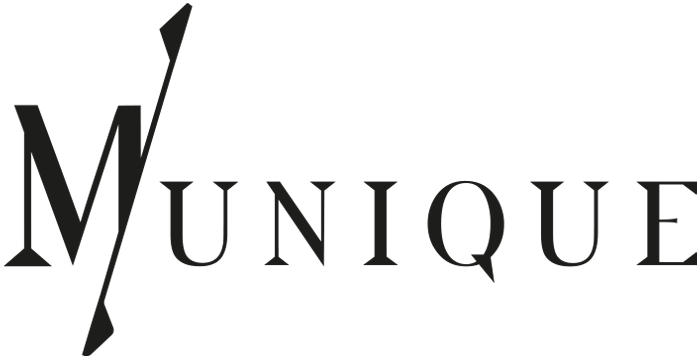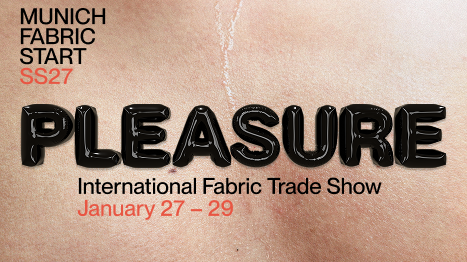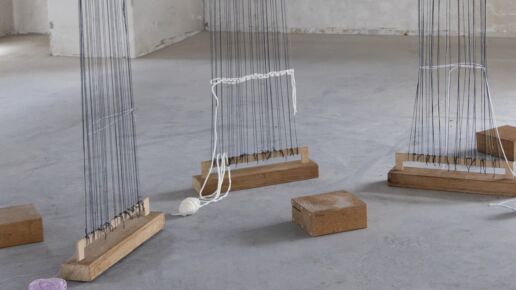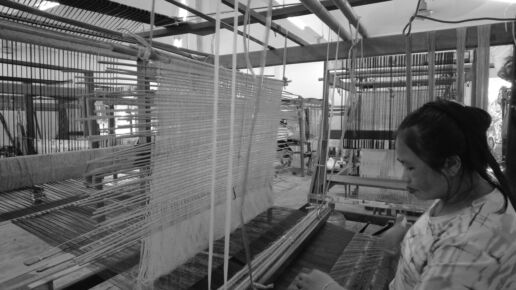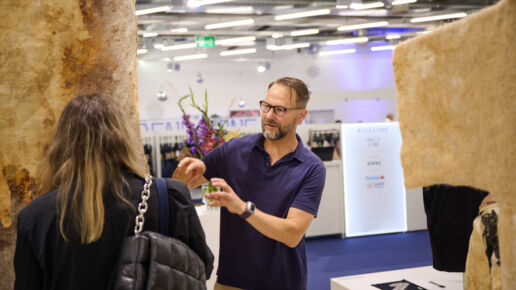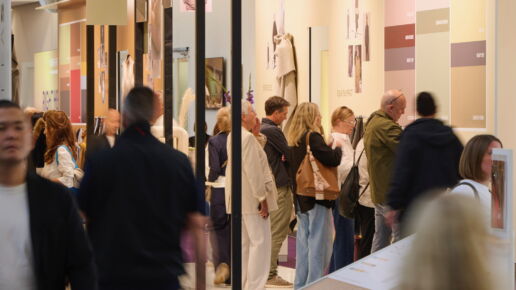BIOTEXFUTURE is an innovation initiative funded by the German Federal Ministry of Education and Research in collaboration with RWTH Aachen University and adidas AG. It aims to transform the textile industry from petroleum-based to bio-based materials, promoting sustainability and bioeconomy. By working with industry and research partners, BIOTEXFUTURE supports the development of bio-based textiles through various projects and innovation spaces. The initiative focuses on creating sustainable raw materials, advancing biopolymer technology, and facilitating a societal shift towards eco-friendly textile solutions.
The TransitionLab, led by the Institute of Textile Technology at RWTH Aachen University (ITA) in collaboration with adidas, focuses on the big picture: creating a sustainable, bio-based textile industry. This involves creating closed-loop systems where materials can be reused and recycled, reducing waste and promoting resource efficiency. One of the key goals is to enhance the environmental performance of textiles by developing bio-based materials that can be used in various applications, including technical textiles, automotive, clothing, and home textiles.


The LightLining project in collaboration with adidas aims to develop sustainable insulating textiles made entirely from aerogel fibers. At the heart of the project are cellulose aerogel textiles that, unlike traditional rigid aerogel products, are both flexible and highly insulating. These textiles combine the benefits of aerogels, such as lightweight and superior thermal insulation, with the flexibility and processability of conventional textiles. This innovative approach promises a cost-effective and scalable solution for energy-efficient applications.
FungalFibers is another collaborative project between the ITA and adidas, aiming to develop sustainable textile solutions using fungal-derived materials. This innovative project explores the use of fungal fibers as a renewable, bio-based alternative to traditional synthetic fibers in the textile industry. Fungal fibers offer several environmental benefits, such as biodegradability and reduced reliance on fossil fuels. The project focuses on optimizing the production process of fungal fibers to ensure they meet the performance standards required for various textile applications.


BioTurf is a sustainable, next-generation artificial turf made from bio-based polymers. Traditional hybrid grass, as used in international tournaments such as the 2024 European Football Championships, combines natural and synthetic fibers which is not environmentally sustainable due to intensive maintenance and difficult disposal. BioTurf can significantly reduce CO2 emissions and water pollution since it uses biodegradable fungal pigments for coloring and requires no harmful chemicals, making it an eco-friendly and durable alternative for sports fields. Thermobonding, the new method employed for the development of BioTurf, avoids energy-intensive latex backing, making it nearly fully recyclable. BioTurf not only meets FIFA standards but also supports the circular economy by using non-food agricultural waste to foster a more sustainable future for sports infrastructure.
“We are delighted to be taking part in Munich Fabric Start in September. This time, we are turning the trade fair into a real-life laboratory and invite all visitors to support us in our research activities. Newly developed products have the potential to have an immediate impact on our everyday lives – this is why people and their needs should be involved in research at an early stage.”

BioTurf

FungalFibers

TransitionLab

LightLining
Visit BIOTEXFUTURE H7 KH | K 14
THIS MIGHT BE ALSO INTERESTING FOR YOU
MUNICH FABRIC START – January 26 closing report
30. January 2026
A solid trade show. An optimistic mindset. That sums up the outcome of MUNICH FABRIC START. After three days, the Munich textile fair came to an end yesterday, Thursday, with the integrated show-in-shows BLUEZONE, KEYHOUSE and THE SOURCE. MUNICH FABRIC START concluded with a stable visitor frequency compared to the previous event.
MUNICH FABRIC START – Between Attitude and Sensuality
26. January 2026
The future begins where we reimagine it. The overarching theme of PLEASURE stands for fashion as an emotional space, as an expression of attitude and cultural reflection.
KnitForm+ by Jeanne Mora – SUSTAINABLE INNOVATIONS
20. January 2026
What matters is how the textile responds: how it regulates volume, distributes pressure, and transitions from flat to three-dimensional states. Process transparency is embedded in the methodology itself.
Cartoon – WEAR YOUR OPTIMISM
20. January 2026
Embark on this fashionable journey and discover the new Cartoon collection at our store. Be inspired, mix and match to your heart's content, and wear optimism—every day, for every occasion.
RETRAKT – SUSTAINABLE INNOVATIONS
19. January 2026
Performance, in this context, is measured by organisational resilience. RETRAKT applies resilience engineering to help employees anticipate, monitor, respond to, and learn from complex and changing requirements.
MATERIA FUTURA – SUSTAINABLE INNOVATIONS
18. January 2026
Materia Futura is not proposing a new bio-material category, nor a finished commercial textile. What distinguishes the project is its design-led investigation into the emotional and aesthetic dimensions of bio-based materials, an area often sidelined in sustainability discourse.
THREADED PROTOCOLS – SUSTAINABLE INNOVATIONS
17. January 2026
Threaded Protocols is not a textile innovation in the commercial sense, nor a digital tool disguised as craft. What makes the work distinct is its material investigation into how computational logic originates in textile practice and what is lost when those logics are abstracted into opaque technological systems.
MARIE VILAY – SUSTAINABLE INNOVATIONS
16. January 2026
Marie Vilay does not present a new fabric or production technique. What distinguishes her work is a method of reading and translating textile knowledge across cultures, systems, and moments of transition.
Interview with Simon Angel, Curator of SUSTAINABLE INNOVATIONS
15. January 2026
Each season, the Sustainable Innovations forum brings together projects that provoke, inspire, and challenge assumptions. This year is no exception, with work ranging from bio-luxury couture to energy-generating textiles and regenerative materials grown from wetlands.
MUNICH FABRIC START – September 25 closing report
4. September 2025
At its 56th edition, MUNICH FABRIC START reinforced its clear positioning. Over two days, the Munich textile trade show brought the fashion industry together with its four show-in-show formats.
